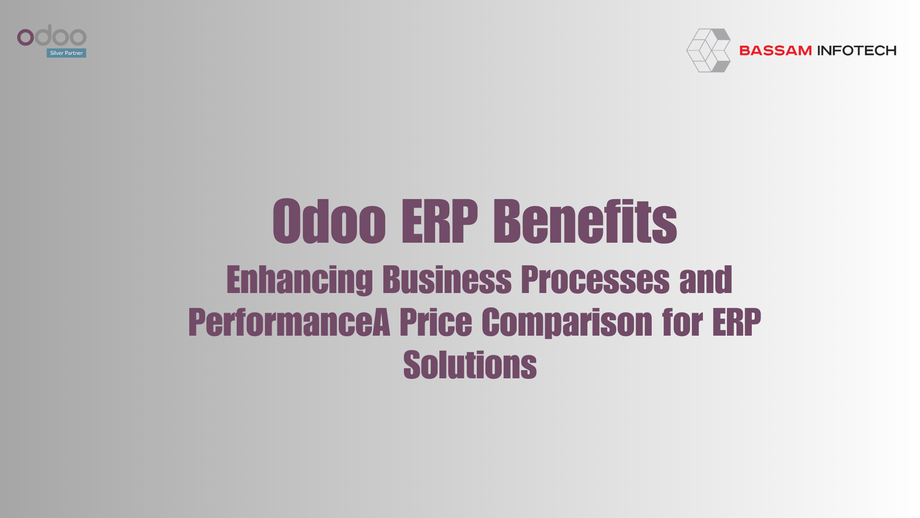One of the most effective tools for achieving these goals is an Enterprise Resource Planning (ERP) system. Among the various ERP solutions available, Odoo ERP stands out due to its flexibility, scalability, and comprehensive suite of applications. This article delves into the key benefits of Odoo ERP and how it can enhance business processes and performance across different industries.
What is Odoo ERP?
Odoo is an open-source ERP platform that offers a wide range of business applications, including modules for finance, sales, inventory, manufacturing, human resources, and more. Its modular structure allows businesses to start with the basics and expand as their needs grow. Unlike traditional ERP systems, which can be rigid and expensive, Odoo is designed to be user-friendly, cost-effective, and highly customizable, making it an ideal solution for businesses of all sizes.
Key Benefits of Odoo ERP
- Improved Efficiency and Productivity
Odoo ERP integrates various business processes into a single platform, eliminating the need for disparate systems and manual data entry. By automating routine tasks and providing real-time access to information, Odoo helps businesses save time and reduce errors. This improved efficiency leads to higher productivity and allows employees to focus on more strategic tasks.
-
Enhanced Decision-Making with Real-Time Data
In today’s data-driven world, having access to accurate and up-to-date information is crucial for making informed decisions. Odoo ERP provides real-time data and analytics across all business functions, from sales and inventory to finance and HR. This transparency enables managers to make better decisions, respond quickly to market changes, and capitalize on new opportunities.
-
Scalability and Flexibility
One of the standout features of Odoo ERP is its scalability. As a business grows, its needs and requirements change. Odoo’s modular structure allows companies to easily add new modules and functionalities without disrupting existing operations. This flexibility ensures that the ERP system evolves with the business, supporting growth and adaptation in a rapidly changing environment.
-
Cost-Effective Solution
Implementing an ERP system is often associated with high costs, particularly with proprietary solutions that require significant upfront investment. Odoo ERP, being open-source, offers a more cost-effective alternative. Businesses can start with the essential modules and gradually expand as needed, without incurring the hefty licensing fees typical of traditional ERP systems. Additionally, Odoo’s cloud-based deployment options further reduce infrastructure costs.
-
Seamless Integration with Existing Systems
Odoo ERP is designed to integrate seamlessly with other software and systems, such as CRM, e-commerce platforms, and third-party applications. This interoperability ensures that businesses can continue using their existing tools while benefiting from the comprehensive capabilities of Odoo. The result is a cohesive ecosystem where all systems work together to support the organization’s goals.
-
Enhanced Collaboration and Communication
Odoo ERP fosters collaboration and communication within the organization by providing a centralized platform where all departments can access and share information. This interconnectedness breaks down silos and encourages teamwork, leading to more cohesive and efficient operations. Whether it’s sharing project updates, tracking customer interactions, or managing inventory levels, Odoo ensures that everyone is on the same page.
-
Customization to Meet Specific Business Needs
Every business is unique, with its own set of processes, challenges, and goals. Odoo ERP recognizes this and offers extensive customization options. Whether it’s creating custom workflows, designing unique reports, or developing new modules, Odoo can be tailored to meet the specific needs of any business. This customization capability ensures that the ERP system aligns perfectly with the organization’s operations and objectives.
-
Improved Customer Relationship Management (CRM)
Customer satisfaction is a key driver of business success. Odoo ERP includes a powerful CRM module that helps businesses manage customer interactions, track sales opportunities, and nurture leads. By providing a 360-degree view of customer activities, Odoo enables businesses to deliver personalized service, improve customer retention, and boost sales performance.
-
Compliance and Reporting
In an era of increasing regulatory requirements, businesses must ensure compliance with various laws and standards. Odoo ERP simplifies compliance by providing built-in reporting and audit features. Whether it’s financial reporting, tax compliance, or industry-specific regulations, Odoo helps businesses stay compliant and avoid costly penalties.
Odoo ERP is a versatile and powerful tool that can significantly enhance business processes and performance. From improving efficiency and decision-making to fostering collaboration and ensuring compliance, Odoo offers a wide range of benefits that can help businesses thrive in today’s competitive landscape. Whether you’re a small startup or a large enterprise, Odoo ERP provides the flexibility, scalability, and customization needed to meet your unique business needs and drive long-term success.

